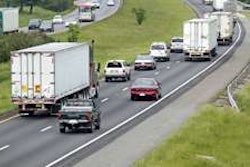
ATA says carriers should accept the inevitability of an EOBR mandate and begin embracing the technology. Citing studies that show positive correlations between companies that log driver hours electronically and the overall safety of those companies, Graves said it is difficult for ATA to oppose such a mandate.
“We are on that glide path today where every vehicle very soon will be required to use electronic logging,” said Graves. “As much as we still have individuals in our industry unwilling to embrace electronic logging, it is simply going to happen.”
Graves also recognized the efforts of TMC’s onboard vehicle electronics committee to ensure technical performance and accuracy, issuing a 22-page technical policy advisory for EOBR systems that will assist ATA in shaping comments for the proposed rule.
On the topic of fuel efficiency standards being proposed by the National Highway Transportation Safety Administration and the U.S. Environmental Protection Agency, Graves said the timing of the standards is good for the industry as fuel prices continue to increase.
“Nobody has a greater motivation to be fuel efficient than the people in the trucking business,” said Graves. Concerns remain on how the program would be implemented and the fuel economy responsibilities are shared among engine manufacturers, OEMs and end users.
“If it costs us more than we benefit from the fuel efficiency, then we have a problem with that,” Graves added.
Addressing the urgent need for infrastructure funding and development, Graves said a fuel tax increase is unlikely, but Congress is promising a reform program to look at where fuel tax dollars are being deferred into non-road and bridge projects. “To the extent that Congress cleans up the program and shifts that money back into things we care about, we think that’s a good start in terms of acknowledging the importance of roads and bridges,” said Graves.










